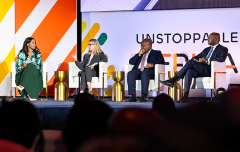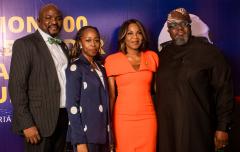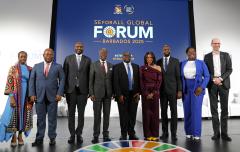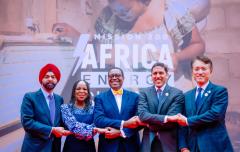Unlocking energy, jobs and opportunity for Africa’s growing young population
At a workshop in Marimauta Village, Zimbabwe, business is booming.
Local entrepreneurs drop by to commission bespoke machinery. A solar-powered maize processing machine serves farmers across the region. Young apprentices learn new technical and digital skills.
The scene contrasts sharply with 2019 when Cyclone Idai ripped through the area, tearing down power lines and shuttering businesses. For months, workshop owner Jacob Mukunukuji and his neighbors struggled with expensive, noisy diesel generators that could barely power basic tools, let alone the heavy-duty machinery that Jacob’s burgeoning business demanded.
"Having electricity is very important," Jacob, 31, says. "If I want to fabricate metal to any extent, I'm able to do it because there's plenty of electricity."
Of the 685 million people across the world who lack access to electricity, nearly 600 million live in Sub-Saharan Africa. Students are unable to study after nightfall. Businesses cannot thrive. And local and national economies falter for want of power to run businesses, create jobs, and grow.
At the same time, Africa has the world’s fastest growing, and youngest, population. More than 60% of people are under 25 years old. According to the UN’s Economic Council for Africa, the continent’s youth population is expected to grow by 138 million in the next 25 years.
This is both a huge challenge – and an opportunity. At the current rate of growth, Africa will not be able to create enough good, dignified jobs for its growing population. And with so many lacking access to both electricity, and to the finance, training and business support to accelerate its uptake, realizing the necessary economic growth will be hard.
Yet, with the right investment, Africa can unlock trillions in growth and become a key driver of global economic resilience and clean energy innovation. Africa’s abundant natural resources and renewable energy potential alone could create up to 100 million new and improved jobs and livelihoods by 2050.
With the right support, Africa’s energetic young workforce could help the continent leapfrog traditional fuels and power a bright, clean and prosperous future, becoming both the drivers and the beneficiaries of this transformation.
Access to electricity, paired with apprenticeships, technical training and finance, can empower them to grow businesses and fuel progress across multiple sectors from agriculture and manufacturing, to energy leadership and beyond. With clean, affordable, and stable energy, young people have more opportunities to further their education, build skills, start businesses, and help others progress.
Consider Hasmia Sidratu Bangura from Sierra Leone. After a clean energy traineeship program, this young engineering graduate became a field technician at a renewable energy company, sharing the skills she gained to power her country’s sustainable growth.
In Nigeria’s Kiguna Community, women fishers made use of innovative financing to obtain a solar-powered cold storage facility, reviving local commerce and bringing new life to their community. “Now our food doesn’t spoil, and we don’t need to sell it cheaply,” says fish trader and entrepreneur Blessing Bitrus.
In Kenya, John Masha Ngowa’s barbershop in Tezo operates well into the evening thanks to off-grid solar power.
Meanwhile, in Zimbabwe, Jacob’s workshop regularly hosts apprenticeships. Last year, four students earned certificates in welding and fabrication, opening doors to new careers.
Our five organizations – the World Bank and the African Development Bank, supported by Sustainable Energy for All (SEforALL), the Global Energy Alliance for People and Planet (GEAPP), and The Rockefeller Foundation with its charitable offshoot, RF Catalytic Capital – are united to accelerate this growth.
Mission 300 is our bold initiative to connect 300 million Africans to electricity by 2030. By pooling resources, influence, and expertise and partnering with governments, businesses, and communities we are transforming energy markets, scaling finance, and helping governments set and deliver on national energy goals.
And we are committed to ensuring electricity access is paired with the right tools, finance, and training to upskill a dynamic young workforce and spark a ripple effect of innovation, entrepreneurship, and jobs.
The power line that reconnected Jacob and his community to electricity was funded by the African Development Bank.
The solar power and cold storage that transformed Blessing’s community was enabled by GEAPP and partners.
The training that allowed Hasmia to advance her clean energy career, was provided by SEforALL, equipping young energy professionals across Africa to lead sustainable energy development.
The mini-grids powering schools and businesses in rural Kenya were supported by the World Bank's Off Grid Solar Access Project bringing solar mini grids to power schools, health clinics, and homes – and benefitting 1.5 million people.
The task ahead is immense and critically urgent. As we gather at the Africa Energy Forum and Youth Energy Summit, we are proud to join youth voices to deliver this message to policymakers, investors and partners: Let’s accelerate energy access, alongside investment in talent and workforce development.
By investing in Africa’s youth, Mission 300 is ensuring that every new electricity connection is a stepping stone for jobs and growth, paving the way to Africa’s energy-rich and prosperous future.
Authors
Makena Ireri, Managing Director, Demand, Jobs and Livelihoods, GEAPP
Lolade Abiola, Programme Manager, ETO Nigeria, SEforALL
Wadzanayi Muchenje, Director, African Regional Office, The Rockefeller Foundation
Johanna Christine Galan, Mission 300 Coordinator/ Senior Energy Specialist, World Bank
Caroline Makenzi, Principal Program Coordinator, Energy and Climate, African Development Bank




